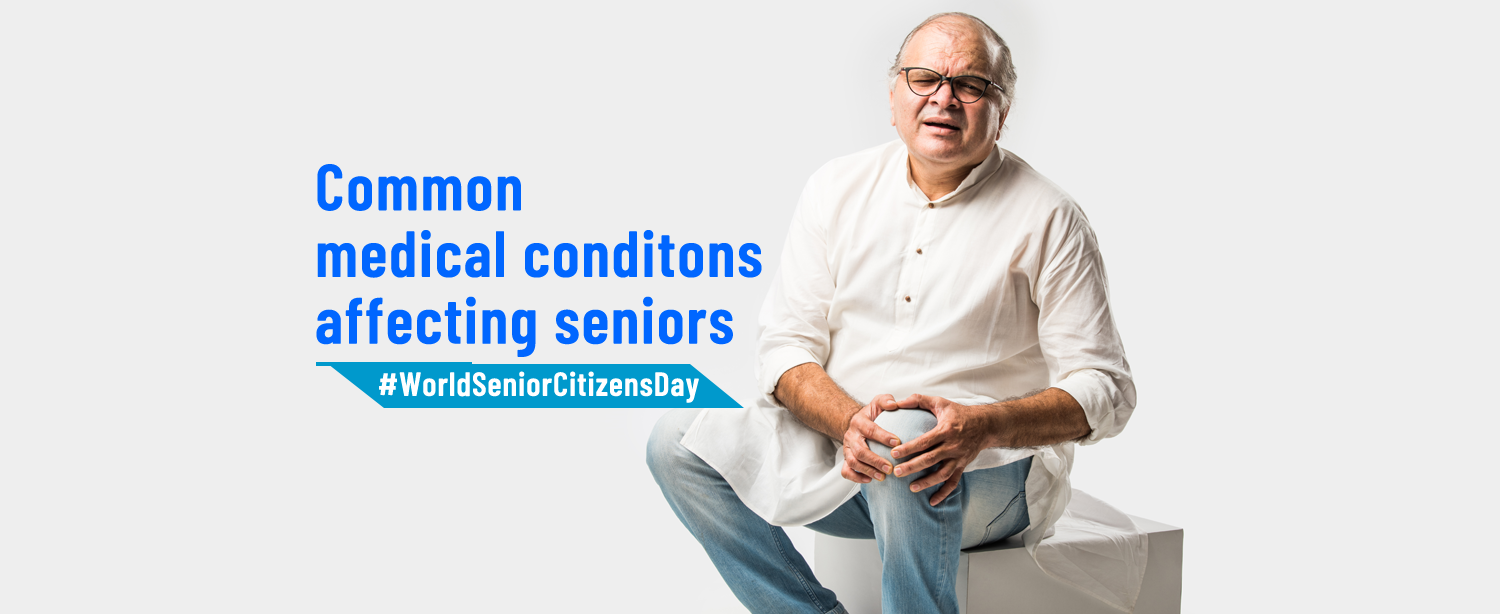Have you noticed changes in your parents as they get older? Being forgetful, slow cognitive skills, reduced mobility as well as decreased hearing skills are some common conditions faced by the elderly. Physical as well as mental changes increase drastically with age and certain conditions are more commonly found in the elderly than the young. It is important to know if the differences you’re seeing are normal, or if they could be a sign of something more serious. As per the National Statistical Office (NSO)’s Elderly in India 2021 report, India’s elderly population (aged 60 and above) is projected to touch 194 million in 2031 from 138 million in 2021, a 41 per cent increase over a decade.
Common Age-related Diseases:
With the population of seniors rapidly increasing it is important to understand the challenges faced by people as they age. Increased awareness, early diagnosis and taking preventive measures can help you or a loved one on a path to healthy aging. Here are some common health disorders seen in seniors:
- Bone & Joint problems
Arthritis is the most common condition that people 65 or older suffer from. It can lead to pain and lower quality of life for some seniors. A large number of people over age 50 also suffer from low bone mass or osteoporosis, putting them at risk for a fracture or break that could lead to poor senior health and reduced quality of life.
- Heart Disease
For those over the age of 65, heart disease is the leading cause of mortality. High blood pressure and cholesterol must be managed properly and taking good care of your heart is essential to reduce your risk of getting heart disease.
- Cancer
Cancer is the second leading cause of death among people over age 65. If caught early through screenings, such as mammograms, colonoscopies, pap smear tests and skin checks, many types of cancer are treatable.
- Respiratory Diseases
Chronic lower respiratory diseases, such as chronic obstructive pulmonary disease (COPD), asthma, pneumonia are the third most common cause of death among people 65 and older. Regular lung function testing, as well as taking the proper medicine or using oxygen as directed, will help you maintain your health.
- Diabetes
Statistics suggest that 25 percent of people aged 65 and older are living with diabetes, a significant senior health risk. With simple blood tests for blood sugar levels, diabetes can be detected and treated early. The sooner you realise you have diabetes or are at risk for it, the sooner you can take steps to manage it.
- Falls
With age, the number of accidental falls that result in disability, surgery, or fracture risk rises. Most of these falls occur in the home, where tripping hazards include area rugs, loose wires and slippery bathroom floors. Falls are the leading cause of injury among older adults, and maintaining your balance and mobility is key in fall prevention.
- Vision or hearing loss
Maintaining regular screenings for your vision and hearing is vital as you age. Millions of elderly people suffer from age-related eye problems such macular degeneration, cataracts, and glaucoma, and a majority of people with hearing loss are 65 or older.
- Mental Disorders
Mental health, like physical health, deteriorates with age, which explains why about 15% of persons aged 60 and up suffer from at least one mental condition. Common conditions include Parkinson’s, depression, anxiety, and Alzheimer’s disease. Exercising, adopting a pet, socializing, taking up a hobby, playing puzzles or reading can help you cope better with mental health disorders.
- Oral health problems
As you age, your mouth tends to become dryer and cavities are more difficult to prevent. Practicing good oral hygiene and visiting the dentist for a cleaning every six months will help keep your teeth and gums in good shape.
- Bladder and prostate disorders
As men and women age, it is difficult to control bladder as it may be less able to store urine. This causes you to pass urine more frequently and even lead to incontinence. In men, the prostate gland tends to enlarge with aging, gradually blocking the flow of urine. If untreated, this may also lead to kidney damage.
Medical care for the elderly at Kokilaben Dhirubai Ambani Hospital
Your family history, age and lifestyle play a large role in your risk for certain medical conditions. Age gracefully with expert elderly health care at our Geriatric Clinic. Our senior healthcare team can help you learn how to live better with existing health conditions. Many health conditions in the elderly can be prevented or the progression slowed by making healthy lifestyle choices and being regular with your health checkups. To know more about our specialised health packages for senior citizens contact our Executive Health Checkup team. Please find below the link for further details: https://online.kokilabenhospital.com/health-checkup
https://www.kokilabenhospital.com/departments/clinicsatkh/geriatricclinic.html


